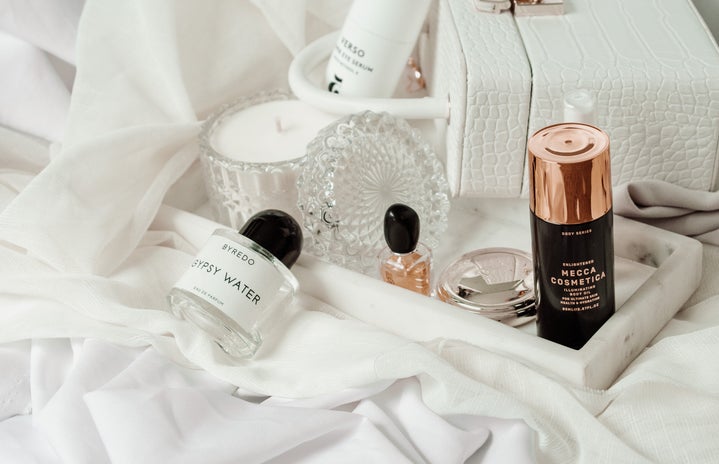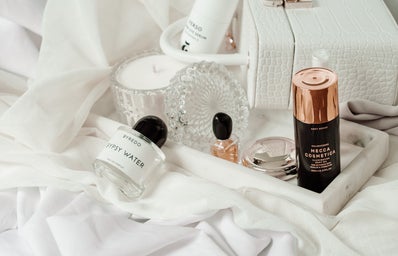We all have an occasional moment where we look down at our arms or legs and they look as if you’re a decaying, grey white-walker, fresh out of Game of Thrones. Here are some hacks to prevent this from happening or just to assist with damage control. If you have any chronic skin conditions or sensitive skin, please use these hacks with caution and check with your doctor first.
1) Drink water and eat well
I’m not going to even harp on these points. We both know they’re incredibly important for your skin and overall health. You know that cheese-burger is going to wreak havoc on your skin – just don’t. Try to eat more fresh fruits and veggies to give your skin the necessary nutrients and antioxidants. If you are unable to do so (because campus happens) try to add some vitamin and mineral supplements to your diet. Vitamins A, C .D , E and zinc are great places to start. Water helps keep your skin clear, fresh and dewy (I know you know this, but if you clicked on this link, you probably needed a reminder).
According to WebMD, “exercise doesn’t detoxify the skin…But by increasing blood flow, a bit of exercise helps flush cellular debris out of the system…You can think of it as cleansing your skin from the inside”. Some skin conditions are triggered by stress and it has been proven that exercise assists in decreasing stress and anxiety. Read about the other skin care benefits exercise has here. That being said, sweat may aggravate certain skin conditions, so do take care.
3) Cleanse, tone and moisturise.
Many of us tend to neglect one (or all) of these steps. But doing them all every morning and night maintains your skin’s overall health and radiance. Cleansing removes excess oil and any build-up and pollutants from the day. Toning helps remove the last bit of gunk, tightens pores and assists the skin in retaining moisture. Moisturising rehydrates, heals and protects it. Read further on how to do this here Always use products that work for your skin. You may need to switch up up your products a few times a year as the seasons do affect your skin.
4) If your skin is dry or flaky, use oil
I suggest using coconut oil, but olive oil or baby oil works just as well. Before you shower or go to bed, slather it on richly, all over your body (your hair too, because why not?) and just chill with it on for an hour or two. Be sure to apply as much oil to your hands as possible – not just because they do so much for you, but because it prevents you from texting any fuccbois.
Your pillow has seen you at your worst. Crying over that ugly dude, drooling in your sleep, going to bed with all your makeup on after a girls’ night out, napping after a long day of essay-writing (sorry, I meant binge-watching Riverdale). All of this results in a breeding ground of sebum, germs and dust. Try to wash it at least once a week, or more often if you have acne-prone skin.
6) Remember your lips have skin too
Remember how Ana kept licking/biting her lips in 50 Shades of Grey and it attracted Christian to her? Well I’m here to tell you not to do that. Not only because Christian Grey is the worst and why would you want that, but because saliva contains digestive enzymes that breaks your food down and does the same to the delicate skin on your lips when you lick them. Instead, keep lip-balm, or even a little pot of Vaseline everywhere you are and keep reapplying (about every 20 minutes) for a soft, smooth, kissable pout that will hopefully attract a cute, caring, none-sociopathic, woke bae.
7) Find a face mask that works for you
Bubble masks, peel-off masks, leave-in hydrating masks… Your options are endless. Once you determine your skin type and what your skin needs, you can go crazy. As someone with dry/combination skin, I like using two to three different masks depending on what that specific area of skin needs. Take note that different masks have different specified timings. Some masks, when left on for too long, may irritate your skin.
8) Use makeup sparingly
Makeup may aggravate skin sensitivity and result in blackheads, whiteheads and pimples. Try to limit your use of makeup and use high-quality, non-comedogenic, hypoallergenic products. Also, wash your makeup brushes. I don’t have to tell you why. Build-up on those brushes + bacteria + sensitive skin = unnecessary skin problems.
Please note that some of these hacks may not be suitable for everyone and should be used with caution.


